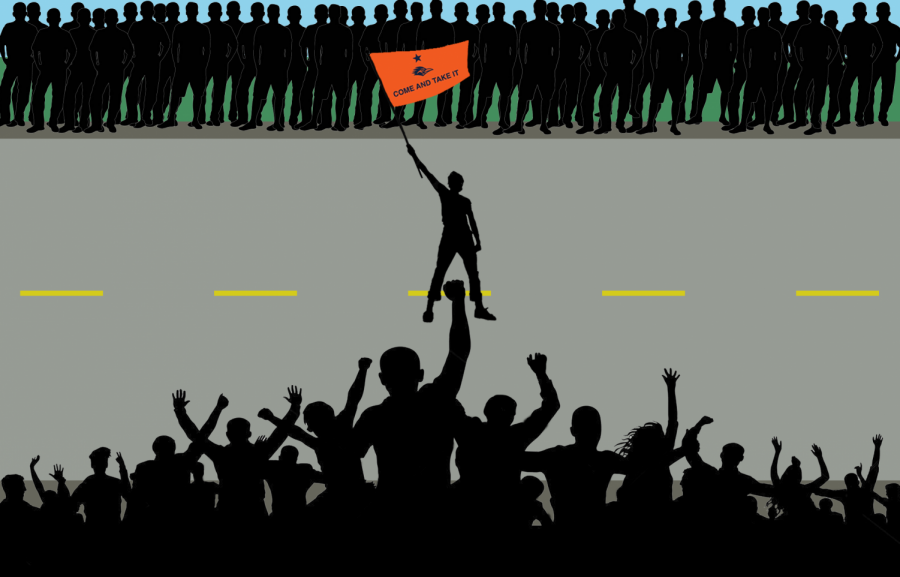Students express various concerns on removal of the ‘Come and Take It’ slogan
September 21, 2021
After the creation of a task force that deliberated on UTSA’s tradition of using the ‘Come and Take It’ slogan at football games, President Eighmy, last week, announced his intention to end the UTSA Athletics tradition.
The practice began in 2016, during the fourth quarter at UTSA home football games the massive “Come and Take It” flag was unfurled across the student section. Over the last few years, the phrase became affiliated with political and cultural movements. Most notably, versions of the motto were displayed at the Jan. 6 insurrection at the U.S Capitol. In President Eighmy’s email to students, he mentioned the values and agendas from said organizations “differ significantly from ours.”
The decision from President Eighmy has received strong opposition from the UT Systems Board of regents. In a statement last week, Chair Kevin Eltife expressed his displeasure with the university’s conclusion of the slogan. “The Board of Regents does not support abandoning traditions and history that mean much to students, alumni, and other Texans,” Eltife said. “I am very disappointed with this decision and will immediately ask our Board to establish policies that ensure that the governing body of the UT System will have the opportunity in the future to be consulted before important university traditions and observances are changed.”
Among UTSA students that were interviewed, some showed indifference while others shared their disagreement with the university’s decision. Sebastian Boyer, a UTSA student majoring in business finance, was one of the students who thought the tradition was important to Texas pride.
“I wasn’t really that happy with it to be honest,” Boyer said. “I really liked having the ‘Come and Take It’ as a pride of being in Texas. I can see why people would think it’s like a racist term, but I don’t see it that way, I see it as a prideful event of being in Texas.”
Business management major Caleb Moerdyk noted the messaging of the phrase when it came to sports, noting it as a rallying cry rather than an offensive slogan.
“I think it’s a pretty old and integral part of San Antonio and Texas culture,” Moerdyk said. “I don’t know what the premise is for them taking it down or not using it, but to me it’s just a symbol of ‘we’re going to get the job done, we’re going to do what it takes to succeed to reach our goals and if someone wants to stand up against that then go ahead and try because we’re going to keep pressing forward.’ That’s what it means to me and I don’t see why there would be a big need to take that away from us.”
Sophomores Anthony Hosman and Ryan Rivera both stated that they did not have any transgression against the flag and didn’t find it necessary to do away with the tradition.
Amanda Harper, senior philosophy major, said she hadn’t done too much research and introspection to how she felt about the decision, but did note the importance of tradition.
“Traditions are important for morale, they’re important for people that used to go to UTSA and then future students aren’t going to really understand the importance of those traditions if we get rid of them,” Harper said. “I guess that would be the only real opinion that I have in terms of losing the flag because traditions are important and future students may not even know why it was important to past UTSA students.”
Other students were in support of the university and its decision to remove the Come and Take It flag. Sophia Gomez, freshman political science major, made note of the history behind the flag as valid reasoning to remove it.
“I feel like the flag is kind of outdated,” Gomez said. “We’re better off without it because it’s kind of like moving on. That was a part of history, but that doesn’t mean we have to keep holding on to that especially with such a historical event such as Texas getting its independence.”
Robert Benavidez, an employee for UTSA, also voiced his support for UTSA’s decision. He pointed to the research the university conducted as well as the need to prioritize other things about the tradition.
“I think it’s whatever the president decides. I’m sure that it’s not just his sole decision. I’m sure there was a lot of input behind the decision and as an employee I totally understand and I respect all ideas and all beliefs,” Benavidez said. “I respect the decision and I don’t have a problem with it. I don’t think that it is hurting anybody; there are bigger concerns in the world, in my opinion, that need to be addressed and that is probably last of my personal concerns that need to be addressed with so many other things that we can be trying to help out, not only in our community, but throughout the world. I think that is where our interests should lie instead of sayings being removed or being added.”
Moreover, Benavidez also mentioned his ability to see both sides of the debate, but emphasized that the decision was already made by the university.
“I see both sides and I see where one side is maybe upset about it and where another side is totally cool with the decision to take down or remove that saying,” Benavidez said. “With that being said, I think personally it really comes down to preference and choice and I think that I respect everybody’s decision to do with it whatever they want and as an American, it really comes down to freedom of speech and whether or not you appreciate it or whether or not you agree with it. It’s something that the president and a lot of other people decided would be best for the university.”












